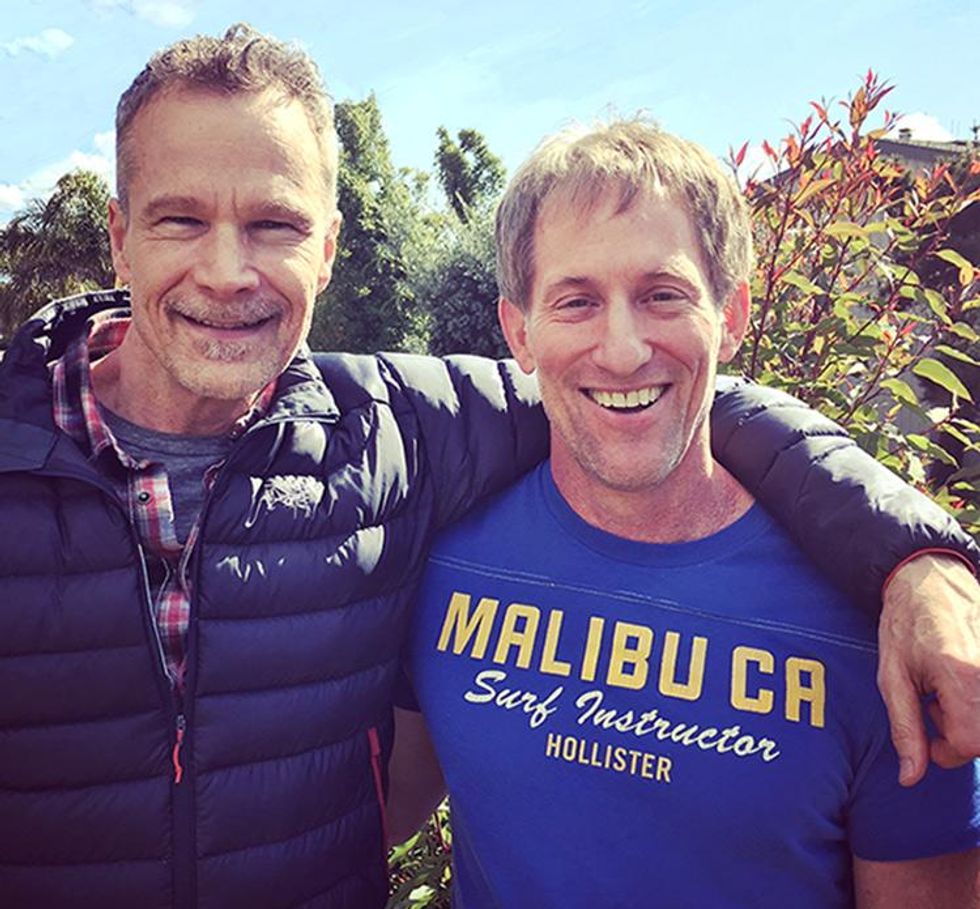A day before the official launch of its Kickstarter campaign for the newly resurrected Physique Pictorial, I talked with the Bob Mizer Foundation's art director, Frederick Woodruff, about the occupational hazards of studying thousands of nude pics of men each month, photographer Bob Mizer's ghost, and why the foundation's new quarterly will be the most exciting publishing relaunch of the year.
[RELATED: A Short But Lurid History of Physique Pictorial on 36 Photos]
The Advocate: How did you and Dennis Bell, the founder of the Bob Mizer Foundation, meet?
Woodruff: We emailed each other out of the blue 20 years ago. I'd become smitten with his website Posingstrap (the name said it all), a site that displayed his collection of vintage nude male photography. And he was a fan of my site Nightcharm, a site I'd created because I thought gay men should have a sex-positive experience that was both horny-making and stylish -- and Dennis liked my design sense.

Above: Frederick Woodruff and Dennis Bell
Didn't you also start a site called Lurid Digs?
Yes! You'd think perusing thousands of nude shots of men each month would be an occupational hazard, but it triggered the idea for Lurid Digs. All of those horrifying interiors in the background of amateur nude shots. Oy. Someone had to analyze them and republish them with design advice. You know you've made it in the world of bad taste when John Waters lists your site as one of his favorites.
Where did you go to school to learn graphic and interior design?
I didn't. I'm self-taught. But my mom's best friend was Blue Note Records' art director Reid Miles. I hung out with Reid a lot when I was a teenager and was influenced by his minimal approach to design. That rubbed off on me. I tried to bring that signature to the new Physique Pictorial.
So you and Dennis decided to team up on resurrecting Physique Pictorial?
Yes. Although it happened organically. Dennis and I started hanging out years ago, shooting nude models together for our websites. When I caught up with him earlier this year we started brainstorming about what a new Physique Pictorial would look like, should it ever be resurrected. One thing led to another and then we just launched forward -- by pure instinct -- into creating the new issue. But some otherworldly factors were at play as well, I mean, I swear I became possessed by Mizer's spirit after hanging out in the foundation's archives for hours each day.
Why bring back a publication when so much information and imagery happens online?
Some kind of "turning" is happening: Vinyl records are back, and people are making things again -- crafts, paintings, gardens, tiny houses. The culture is shifting from left brain, a focus on language and logic, to right brain, an emphasis on imagery and sensation. I don't think people read like they used to. Now it's about pictures. And touching and rubbing things. So that's a long-winded way of saying Dennis and I both wanted to shift our creative drive into making some "thing." Bringing back Physique Pictorial was the obvious way to go -- with its legacy, influence, and of course Mizer's vision.
How would you define Mizer's vision?
Bob was an Aries -- the zodiac's pioneers and activists. Aries folks have an erotically charged sense of style, meaning it's very charismatic. And their relationship to beauty is sexualized as well. They're phallic by nature, meaning they like to butt into things, to push through -- towards the future. Old things don't interest them, but innovative experiences do. When you're sifting through the thousands of photographs in Mizer's archives, you start to sense a tangible magnetism radiating off the prints. The astrologer in me keeps repeating to Dennis, "Oh, my God, Bob was such an Aries!"
Would that explain some of the more outrageous theatrical tableaus that Mizer would assemble?
Yes, absolutely. No realm of human experience was left uncharted. Aside from common gay tropes like cops, cowboys, and gladiators -- Bob would construct sets for slave auctions, haunted houses, Egyptian tombs, outer space laboratories. He redefined the term "'indefatigable imagination." He was showing us that men being attracted to other men could happen anywhere and everywhere -- it needn't be confined to a back alley or cruising spot.
And then, of course, there was the stable of models who occupied those sets. How did Bob's models impact the culture the way, say, Tom of Finland's imagery is evident in today's leather scene?
Well, I think it's more about a spiritedness -- a zestfulness -- not so much literal emblems or accouterments. Although the posing strap seems to have made a comeback with some modern photographers. Bob injected us with his joie de vivre. The majority of Bob's models were having a blast -- fun and freedom were evident and that conveyed an "all rightness" about being gay.
Bob's vision was an antidote to all of the predominant homo associations from the '50s and '60s. You know, gays as child molesters, being mentally ill and shit like those "Boys Beware" instructional films. Bob took Aunt Ida's declaration from Female Trouble -- "Queers are just better" -- and brought that sentiment to life. I think that's what occurs unconsciously when we study Bob's photographs or films. On one level there is the visceral response to male nudity, but at the core we're attracted to the sprit -- the promise of that sort of freedom to just be oneself.
Did Mizer have a strong work ethic -- I mean, was there a casting couch or was he a staunch professional?
Bob worked tirelessly, photographing guys seven days a week for 50 years. So that was his first priority, if not by ethics certainly by habit. But Bob definitely had his favorite models, like John Apache, who we feature in the new Pictorial -- guys that he'd actually let into his home. Allowing a model into his private space was rare, as Mizer had his share of hoodlums and street trade to contend with -- as well as professional fitness models and body builders. The other day Dennis handed me a photo to consider and I commented on the model's wet dick. I asked Dennis: "Was Tico Patterson getting fluffed by Bob?" Dennis eye-rolled and said, "Oh, come on! What do you think?" Studying the monstrous girth of Patterson's dick, I saw how dumb my question was.
[RELATED: 90 Photos to Celebrate the Return of Physique Pictorial]
But Bob's priority was always photographing and then publishing the results. So there is this literal explosion of maleness to cull from while creating each volume. When you pick the magazine up you can feel it. Again, this is what's great about a print publication versus online imagery. There's a boner-generating transmission that's possible -- I guess it's imbued in the wood pulp!
Didn't Mizer also have an activist edge about him?
Yes, another Aries hallmark -- courage! The philosophical uptick to re-creating Physique Pictorial has been reconnecting with Bob's polemics. We've preserved those and run them throughout each new volume. If it weren't for Bob Mizer and how tirelessly he pushed back against obscenity laws in the '50s and '60s, we wouldn't have our daily doses of male flesh and beauty like we do today. Amen! Seriously, Bob was a passionate anti-obscenity front-runner. A lot of gay guys don't know that -- most of them know what he did for male erotic imagery, but not many understand the debt we owe Bob as an activist.
Will the new Physique Pictorial retain Mizer's eclectic blend of photography and illustrations?
Yes. We'll reveal lots of rare archival work from the Mizer estate, and because the foundation's aim is to educate and inspire, we'll publish portfolios of contemporary artists that focus on male physique photography and illustration. You know Bob was responsible for introducing Tom of Finland's artwork to the world, and we're eager to do the same with new talent. Recently I discovered a guy on Instagram -- Leonard Page -- a talented photographer and stunning model who lives in Nashville -- and he's featured in the new Pictorial. We'll also reprint a lot of Bob's raucous editorial content -- always amusing and inspirational. His tips on losing weight were a riot! And he never pulled punches when going after asshole attorneys or disgruntled fans.
So the past has melded with the present-future. You and Dennis are employing Kickstarter to get things up and moving?
Yes, it's a combination pledge drive. Funding to cover the printing of the first few issues as well as the design and administrative costs. It's more difficult and expensive to break away from the ease of publishing online. Too, web pages are forever changing, and there's no machine left that reads 20-year-old floppy disks. Digital data is vulnerable. But print is forever. Bob was all about flesh and by publishing a magazine we're literally back on Mizer's physical vector -- Dennis and I may be pulling the cast together, but Bob is still directing the show.





































































Charlie Kirk DID say stoning gay people was the 'perfect law' — and these other heinous quotes